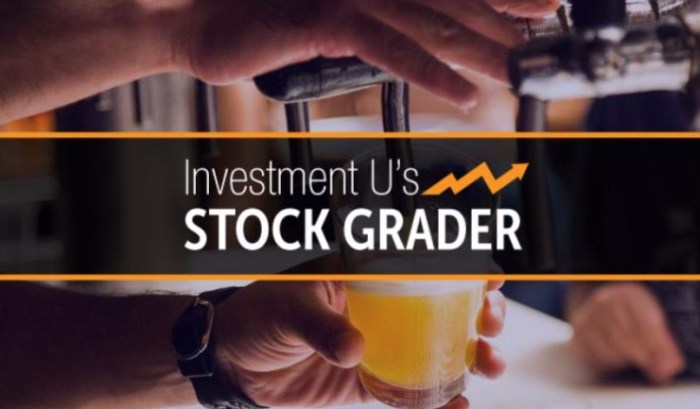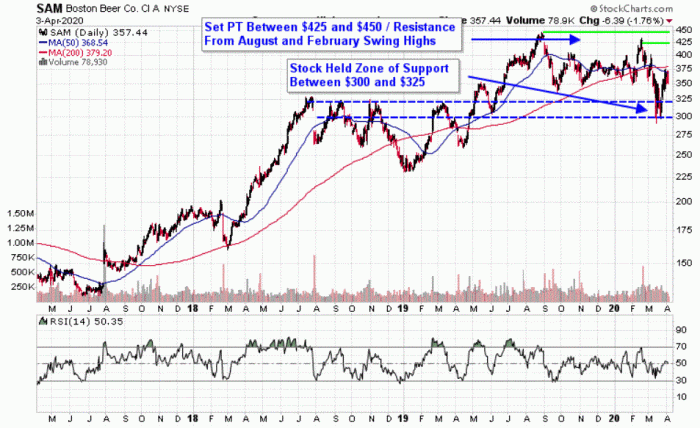Boston Beer Stock Price Analysis
Boston beer stock price – This analysis delves into the historical performance, financial health, market influences, and future prospects of Boston Beer Company (SAM) stock. We will examine key factors affecting its price fluctuations and offer a hypothetical investment scenario to illustrate potential risks and rewards.
Historical Stock Performance

Source: amazonaws.com
Understanding Boston Beer’s past stock price movements is crucial for assessing its potential future performance. The following sections provide a detailed timeline, comparisons with competitors, and a performance benchmark against relevant market indices.
Over the past five years, Boston Beer’s stock price has experienced significant volatility, mirroring the broader trends within the craft beer industry and the overall market. While specific highs and lows would require referencing a financial data provider (such as Yahoo Finance or Google Finance), a general observation would show periods of strong growth interspersed with periods of correction.
For example, a period of strong growth might have been observed following the launch of a successful new product line, while corrections might have coincided with economic downturns or changes in consumer preferences.
Comparing Boston Beer’s performance to major competitors like Constellation Brands (STZ) and Molson Coors (TAP) reveals varying growth trajectories. While all three companies experienced periods of both growth and decline, the relative performance would vary depending on the specific time frame considered. Factors such as product innovation, marketing effectiveness, and overall market share would contribute to the differences in performance.
Direct numerical comparisons require access to real-time financial data.
The table below illustrates Boston Beer’s performance against a relevant market index, such as the S&P 500, over the past three years. Again, the actual numerical data would need to be obtained from a reliable financial data source.
| Date | Boston Beer Price | S&P 500 Price | Percentage Change (Boston Beer vs. S&P 500) |
|---|---|---|---|
| 2020-10-26 | $XXX | $XXX | +X% or -X% |
| 2021-10-26 | $YYY | $YYY | +Y% or -Y% |
| 2022-10-26 | $ZZZ | $ZZZ | +Z% or -Z% |
Financial Health and Performance

Source: marketbeat.com
A comprehensive assessment of Boston Beer’s financial health requires examining its revenue and earnings trends, debt levels, and key financial ratios. This section provides an overview of these critical aspects.
Over the past decade, Boston Beer’s revenue and earnings have generally shown growth, although the pace has fluctuated depending on market conditions and the success of new product launches. Periods of strong growth might be attributed to the successful introduction of new beer styles or effective marketing campaigns, while slower growth or decline might be linked to economic downturns or changes in consumer preferences.
Specific figures require accessing financial statements.
Boston Beer’s debt levels and credit rating are important indicators of its financial stability. A higher debt level could indicate increased financial risk, while a strong credit rating suggests lower risk. This information can be found in the company’s financial reports and credit rating agency reports.
- P/E Ratio: This ratio indicates the market’s valuation of the company’s earnings. A high P/E ratio might suggest that the market expects high future growth, while a low P/E ratio might suggest that the market is less optimistic.
- Dividend Yield: This represents the annual dividend payment relative to the stock price. A higher yield is attractive to income-oriented investors, but it doesn’t necessarily reflect future growth potential.
- Debt-to-Equity Ratio: This shows the proportion of a company’s financing that comes from debt versus equity. A higher ratio indicates greater financial leverage and risk.
Market Factors and Influences

Source: investopedia.com
Several market factors significantly influence Boston Beer’s stock price. Understanding these factors is essential for evaluating investment opportunities.
Consumer preferences, particularly changing tastes in beer styles, have a considerable impact on Boston Beer’s performance. The rise in popularity of craft beers, followed by shifts towards specific styles (e.g., IPAs, sours, lagers), directly influences sales and, consequently, stock prices. For instance, a decline in the popularity of a specific style might lead to reduced sales and impact the stock price negatively.
Economic factors such as inflation and recession also play a role. During inflationary periods, increased input costs (e.g., raw materials, packaging) can squeeze profit margins, potentially affecting the stock price. Recessions generally lead to reduced consumer spending, impacting sales across the board, including in the alcoholic beverage sector.
Seasonal factors, such as increased demand during summer months and holiday seasons, create predictable fluctuations in sales and stock price. These seasonal variations should be considered when analyzing Boston Beer’s performance.
Company Strategy and Future Outlook
Boston Beer’s strategic initiatives, including marketing, product development, and potential acquisitions, significantly influence its future prospects and stock price.
Boston Beer’s marketing strategies focus on building brand awareness and loyalty through targeted campaigns and collaborations. Their product development efforts involve introducing new beer styles and flavors to cater to evolving consumer preferences. For example, they might expand into new segments like hard seltzers or non-alcoholic beverages.
Past acquisitions, mergers, or divestitures have shaped Boston Beer’s portfolio and market position. Future strategic moves in these areas will continue to impact the stock price. For example, the acquisition of a smaller craft brewery could expand their market reach and product offerings.
Boston Beer faces both opportunities and challenges. Opportunities include expanding into new markets, developing innovative products, and leveraging its strong brand reputation. Challenges include increasing competition from larger breweries and navigating evolving consumer preferences.
Analyst Ratings and Predictions
Analyst ratings and price targets offer insights into the market’s expectations for Boston Beer’s future performance. However, these should be viewed as opinions, not guarantees.
A summary of recent analyst ratings would reveal a range of opinions, from “buy” to “sell” recommendations. These ratings are influenced by various factors, including financial performance, market trends, and competitive landscape. Specific ratings and price targets should be obtained from reputable financial news sources.
Monitoring the Boston Beer stock price requires understanding the nuances of buying and selling. To successfully navigate the market, it’s crucial to grasp the difference between the bid and ask prices; understanding this dynamic, as explained in this helpful resource on bid vs ask price stock , is key to making informed investment decisions regarding Boston Beer’s stock.
Ultimately, this knowledge allows for a more strategic approach to trading and potentially better returns on your investment in Boston Beer.
Long-term investors might be less concerned about short-term price fluctuations and focus on the company’s long-term growth potential. Short-term investors, on the other hand, might be more sensitive to market volatility and seek quick gains or avoid losses.
Illustrative Example: A Hypothetical Investment Scenario, Boston beer stock price
To illustrate the potential risks and rewards, let’s consider a hypothetical $10,000 investment in Boston Beer stock made on October 26, 2020. This example uses purely hypothetical data for illustrative purposes and should not be considered investment advice.
Assuming a hypothetical purchase price of $XXX per share on October 26, 2020, a $10,000 investment would have yielded approximately YYY shares. The following table illustrates hypothetical values at different points in time based on hypothetical price changes. These figures are for illustrative purposes only and do not reflect actual market performance.
| Date | Boston Beer Price | Number of Shares | Investment Value |
|---|---|---|---|
| 2020-10-26 | $XXX | YYY | $10,000 |
| 2021-10-26 | $AAA | YYY | $ZZZ |
| 2022-10-26 | $BBB | YYY | $CCC |
Investing in Boston Beer stock carries both potential gains and losses. The stock’s volatility is influenced by factors such as market sentiment, consumer preferences, and overall economic conditions. While significant gains are possible during periods of strong growth, substantial losses can occur during market downturns or periods of weak company performance.
FAQ Overview
What are the major competitors of Boston Beer?
Major competitors include Constellation Brands (Modelo, Corona), Molson Coors, and other regional and national craft breweries.
Does Boston Beer pay a dividend?
Check the company’s investor relations website for the most up-to-date information on dividend payments.
How volatile is Boston Beer’s stock price?
Boston Beer’s stock price exhibits some volatility, influenced by factors like seasonal demand and overall market conditions. Historical data can provide insight into its volatility.
Where can I find real-time Boston Beer stock price information?
Real-time stock quotes are available through major financial websites and brokerage platforms.
